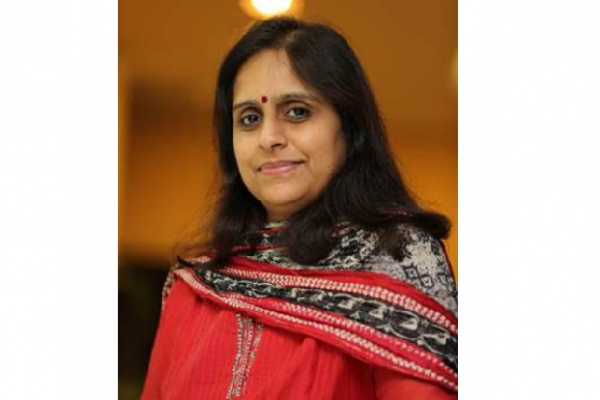On the International Day of Women and Girls in Science, Ms Aruna Viswanathan, Asst. GM, Corporate HR, Tata Chemicals Ltd. shared a few insights about the work practices and policies in place at Tata Chemicals.
Excerpts from the interview:
How many women work at the TATA CHEMICALS R&D and Innovation Labs at Tata Chemicals?
We have two research centres – Pune and Bengaluru across the Tata Chemicals Group – and about 26 per cent of our workforces are women involved with both scientific and support activities. Our research teams in these R&D labs work on multiple cutting edge technologies catering to our business verticals in the space of Performance & Speciality chemicals, nutritional science, Agri-science, and energy sciences. We have some exceptional female scientists leading a few of our significant projects making the organisation proud and boosting our work culture with their determination and achievements.
What is the ratio between men & women in your R&D teams, and what are you doing to bring a balance?
Over the years we have been conscious in our efforts in providing equal opportunities for women to apply for the position of a researcher; however, we still need more women to opt for this profession and encourage them further. The interesting part is that, as per the latest data published by United Nations, India tops the world in producing female graduates in STEM (Science, Technology, and Engineering & Mathematics) but ranks 19th in employing them. The data further suggests that women constitute merely 14 per cent of the total 280,000 scientists, engineers and technologists in research development institutions in India.
We have many women-friendly policies at Tata Chemicals which includes:
♦ Flexi timings
♦ Infant care policy
♦ Safety for women
♦ PhD assistance program
♦ Scholarship programmes for women to pursue their aspirations.
We also ensure upskilling their capabilities through formal training, projects and exposure to various scientific symposium and conferences. We partner with the Group in offering second career options for women who have taken a career break and want to get back to the corporate world either on a full time or part-time basis depending on their commitments. We hope to increase our ratio further over the next few years. We intend to collaborate with academia and premium research institutions giving internship opportunities for women researchers.
What kind of work do they do at Tata Chemicals?
Our Women R&D Scientists are involved in projects of importance in Performance Material Sciences (Alkali and Halogen Chemistry/NanoTech) and Nutrition Sciences (Human and Animal) and Agri-Sciences focussing on developing Hybrid Seed traits and technologies for crop protection and improved farm productivity.
They work in cutting-edge technologies and nurture innovation to retain our competitive edge. These technologies help us transform business and processes to improve efficiencies and customer experience. They are well versed in handling state-of-art instruments in the labs and do handle high-pressure jobs. At the manufacturing locations, we also have women employees who manage shift operations on a 24/7 basis.
What policies have you devised to attract more female talent and encourage them to pursue a career in the field of Science?
Creating a balance and maintaining a diverse workforce is our primary goal at Tata Chemicals. We have a diversity policy in our organisation to drive this point. There is also a diversity council which acts as a governing body to ensure execution. Our diversity agenda goes beyond gender to include differently-abled people, people with different ethnic background, disadvantaged communities and locations.
Our hiring policies are designed in a manner that attracts the best talent. Every year, we insist on a minimum intake of women Graduate Engineer trainees (GET) at entry levels. Also, as they take on regular roles and expand their career, they avail the benefits of our many women-friendly policies. We also give internship opportunities to women students from several institutions in the areas of science and technology.
Any noteworthy work or achievements by women leaders in the team?
Our Women Scientists speak at Conferences and Seminars to progress the advancement of Science and Technology in the country, besides publishing Research papers in High Impact journals and have patents to their credit.
In recent times they conceptualised and launched products of importance in times of Covid-19 - e.g. Higher bio-active ingredients of important agri-products such as curcumin in Turmeric, Multi-surface disinfectant and anti-bacterial /anti-viral veg wash. Besides, our Women Scientists are leading projects in Natural Extracts, Soft Material Composite Sciences which are the next generation areas
How important it is for women to enter R&D and work and how do they contribute?
Earlier there were not as many women who would enter the STEM field as compared to the men. Especially, they would shy away from field jobs in a manufacturing unit. But, it also meant that these industries were deprived of the female perspective and their expertise. Lack of female talent in STEM could be unfavourable for organisations and also, there are chances that less will be known about the female customers’ choices and latent demands. Involving more qualified women in R&D, can enrich the creativity and insight of research projects and increase the chances for more innovation
How can the industry and corporates play a role here to encourage more women in science-related fields? What other support do they need?
Corporates play an important role here. They can make room and encourage women participation in these jobs. With robust policies like Diversity, Equity and Inclusion being adopted by major manufacturing companies there will be equal opportunities for women to join the workforce and advance further in their careers.
Women should be supported, encouraged and most importantly, treated as equals at all age and levels - right from their birth at home, especially through their schooling years, as girls drop out in maximum from educational institutes in schools. These are the fundamental years of their life where not only do they need support and encouragement but also exposure to the outside world where they can find ample examples of successful women who are thriving professionals in the STEM field.
Inspirational stories do create an impact on the students at an early age. The formative years in school and college are when they need our support the most as their belief system in themselves is majorly formed during this time.
The sooner they are empowered with this freedom of choice; they learn to make responsible decisions and expect to be treated with fairness. They learn to compete based on merit and capabilities, which in turn makes them confident to face any challenge.
How successful has been the model of inclusion of women in R&D at TCL? What has been the inclusion rate of women since the time it was launched? How profitable has been the research module until now, in comparison to the department being led by both genders?
Inclusion of women scientists in R&D is very critical. They look at problems differently and are more socially aware of their emotional skillsets. This helps in a range of innovations and breakthroughs which help address various customer requirements. Also, Research Development is collaborative and linked to the strategic focus of the company. Rather than profitability, we examine Success Ratio of the R&D efforts and our women scientists have been faring exceedingly well in that space.
TCL has always been known to uplift women through their various programmes. Can you highlight some of the recent initiatives for women partners (employees) in their R&D department?
We have women scientists leading us in clinical and pre-clinical trials ensuring highest standards, CFT for delivering societal impact and sustainability is led by a Women Scientist. Besides, we have several initiatives to ensure that the eco-system is gender-friendly.
How has COVID impacted the women research teams at TCL? Did you have any layoffs or introduce any special programs for their upliftment?
COVID has impacted everyone equally. The women research teams at TCL have ensured that they conceptualise and launch products of importance in times of Covid-19.
We did not have any layoffs. We have had many women scientists who were rostered to carry on with their experiments in the lab under safe conditions. To ensure their overall wellbeing, we also offered emotional wellness support to them through our employee assistance initiative called "We care".
Are there any female leaders in your R&D teams? If yes, then how has been her leadership model different from others?
Yes, we do have female leaders in R&D who head the departments or verticals. In my opinion, as leaders, they tend to be more humble, empathic and resilient. They are good at defining problem statements more sharply, focus on scientific rigour which is inclusive, as Champions of Change & lead in a collaborative way.
Does your organisation support you in maintaining work-life boundaries?
Trending
-
SBI General Insurance Launches Digital Health Campaign
-
CredR Rolls Out 'Life Happens' Leave For Its Employees
-
Meesho Announces 30-Week Gender-Neutral Parental Leave Policy
-
Microsoft Unveils Tech Resilience Curriculum To Foster An Inclusive Future
-
60% Indian Professionals Looking For Job Change Due To COVID: Survey
-
SpringPeople And Siemens Collaborate For Digital Transformation Push
-
86% Professionals Believe Hybrid Work Is Essential For Work Life Balance: Report
-
Almost 1 In Every 3 People's Personal Life Affected Due To Work Stress
-
Meesho Rolls Out Reset And Recharge Policy For Employees
-
80% Of Talent Leaders & Academics Say Pandemic Changed Skill Needs For Youth: Report
-
Hero Electric Rolls Out 'Hero Care' Program For Employees
-
Human Capital In Collaboration With ASSOCHAM Hosts Virtual Conference
-
IKEA India, Tata STRIVE Collaborate To Create Employability And Entrepreneurship Opportunities
-
SAP India, Microsoft Launch Tech Skilling Program for Young Women
-
DXC Technology, NASSCOM Collaborate For Employability Skills Program
-
Lenskart To Hire Over 2000 Employees Across India By 2022
-
Mindtree Launches Learn-and-Earn Program
-
Tata AIA Extends 'Raksha Ka Teeka' To Its Employees
-
Swadesh Behera Is The New CPO Of Titan
-
NetConnect Global Plans To Recruit 5000 Tech Professionals In India
-
Hubhopper Plans To Hire 60% Of Indian Podcasters By 2022
-
Corporate India Needs More Women In Leadership Roles: Report
-
Aon to Invest $30 Million and Create 10,000 Apprenticeships by 2030
-
Tech Mahindra Launches ‘Gift a Career’ Initiative for Upskilling of Youth
-
40% Women Prefer Flexible Working Options in Post-COVID World: Survey
-
3 out of 4 companies believe they can effectively hire employees virtually: Report
-
Vodafone , CGI and NASSCOM Foundation launch digital skills platform
-
Odisha: Bank, postal employees to deliver cash for elderly, differently-abled persons
-
Skill India launches AI-based digital platform for "Skilled Workforce"
-
Hiring activity declines 6.73% in first quarter: Survey
-
70% startups impacted by COVID-19 pandemic
-
Bajaj Allianz Life ropes in Santanu Banerjee as CHRO
-
Over 70 Percent MSMEs look at cutting jobs to sustain businesses
-
93 Per Cent employees stressed about returning to office post-lockdown
-
Johnson & Johnson India announces family benefits for same gender partners
-
Indian firms turning friendly towards working mothers
-
Welspun India names Rajendra Mehta as new CHRO
-
Wipro partners with NASSCOM to launch Future Skills platform



Human Capital is niche media organisation for HR and Corporate. Our aim is to create an outstanding user experience for all our clients, readers, employers and employees through inspiring, industry-leading content pieces in the form of case studies, analysis, expert reports, authored articles and blogs. We cover topics such as talent acquisition, learning and development, diversity and inclusion, leadership, compensation, recruitment and many more.
Subscribe Now












































Comment